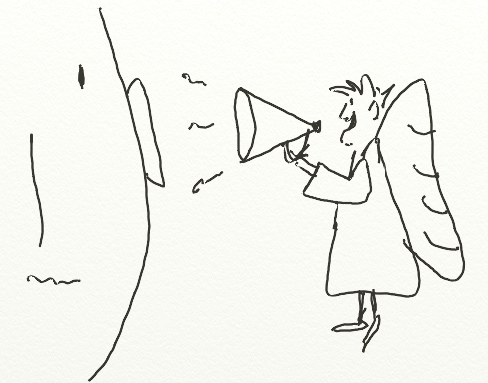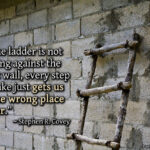The truth of the matter is that you always know the right thing to do. The hard part is doing it. – Norman Schwarzkopf, Jr.
What does that mean?
I was reminded of this quote in a recent e-mail exchange. The discussion included the many tough choices that the person being discussed made, and how they (in my opinion) chose to do the right thing in each case, despite the difficulty. So many people end up choosing the wrong thing, when they know better, only because they decide to take the easy path.
This quote has two parts to it. The first part is the knowing, or not knowing, what is the proper thing to do. The second is acting on that knowledge. As the quote says, the first part is the easy part for most of us. It’s the second part that is often the more difficult.
And that, I believe, is what the quote is warning us about. It’s easy enough to know what to do, but are we strong enough to do it? Are we willing to do what is necessary, to bear the burdens or challenges which the right decision will bring?
Why is having the strength to do the right thing important?
That’s what it comes down to, isn’t it? Knowing right from wrong is the easy part for most of us. Yes, there are people with mental or social issues, and some of them have difficulties with this. But for the vast bulk of the people of the planet, we know. But how often do we do?
That’s where moral strength as well as your personal character come to the fore. If you aren’t strong, if you frequently don’t take the tough but right path, you’re not going to get stronger, and that aspect of your character will become known.
One issue that will remain outside this discussion is the social values in your community. There are parts of the world where the death penalty is routinely enforced, and is (to those who live there) the right thing to do. In other parts of the world, it’s the wrong thing to do.
But regardless of what the issue may be, if it’s the right thing to do, and you don’t do it, you have shown a lack of strength, right? Sometimes telling the truth will get you in a lot of trouble, so you tell a ‘little’ lie. I think we’ve all been there, and (hopefully) learned our lesson.
Where can I apply this in my life?
About the only time I’ve had problems knowing what was the right thing to do was when I let my emotions get in the way. Note how I worded that. Not when I allow my emotions to influence me, or when I allow my emotions to have any say whatsoever in the decision-making process.
Nope. Only when they get in the way. Only when they make it difficult to see what actually needed to be done, or so colored my outlook that I misjudged the problem in the first place. When they got in the way, that’s when I screwed up.
That doesn’t mean I always choose the right path. I manage to fail at that about as much as the next guy, but that’s a failure of execution of the proper path, not a failure in the choosing of the proper path. Does that description of the difference make sense?
So the way I see this, the quote’s practical application is about building the moral strength and the depth of character to do that which you know is right as often as humanly possible. That probably means more often than we presently do, right?
Many of these things we do are habits. Unfortunately, we probably all know (or have known) someone who exaggerates a lot, bending the truth to the point of breaking on a regular basis. They know that’s not how they should behave, but it’s a habit for them now.
We all have habits that sometimes cause us to do something other than what we know is the right thing to do. At least I do, and all of the people I have asked admitted to having this problem at least once in the past. But how do we get out of the habit?
We can start with little things, like not taking the last < insert item here > without replacing it. Yes, it’s easier to not do so, and then say “not me” when asked if we took the last one. But that’s not the right thing to do, is it? See how easy it can be to get started?
Another thing to consider is why you think you have that habit. Do you feel that replacing the toilet paper or tissue box is beneath you? How quickly would your habit change if you changed your belief to be that you’re willing and able to do the right thing, even if it is trivial labor?
It’s not difficult to figure out what needs to be done, to determine what is the right, correct, or proper thing to do. But actually making yourself do that thing, it can be as easy as you decide you are going to make it.
Yes, there will be effort, there will be consequences, but it’s what should be done. So be sure to do it.
From: Twitter, @tonyrobbins
confirmed at : http://www.quotes.net/quote/8949
Photo by -Xv








It’s easier to know the right thimg to do in relation to others than knowing what is the right thing to do for me. I’m speaking of to stay or not stay in a relationship and what are 4he consquences for my happiness.
It helps to do the right thing if you feel good. When I feel like shit, its hard.
Thanks for stopping by and for taking the time to leave a comment.
Yep, been there, done that, and tried to learn from the experience. The quote doesn’t really address emotional state at the time when you’re supposed to do the right thing. Sometimes ‘paying it forward’ (in a bad sense) feels better, if only to see a jerk get what’s coming to them. But deep inside, we know what is right, and what is not right. Strive to do your best, even when you feel less than great. We’re all human, and we’ll take the wrong path from time to time. Learn from it, and consider not making decisions when you know you’re likely to make the wrong one, right?
Pingback: Mondays with Mike: Entrepreneur As Warrior - Business Advice From Military Leaders | Nextiva Blog
Thanks for including me in your list. I also did a post on #2 on your list. 8)